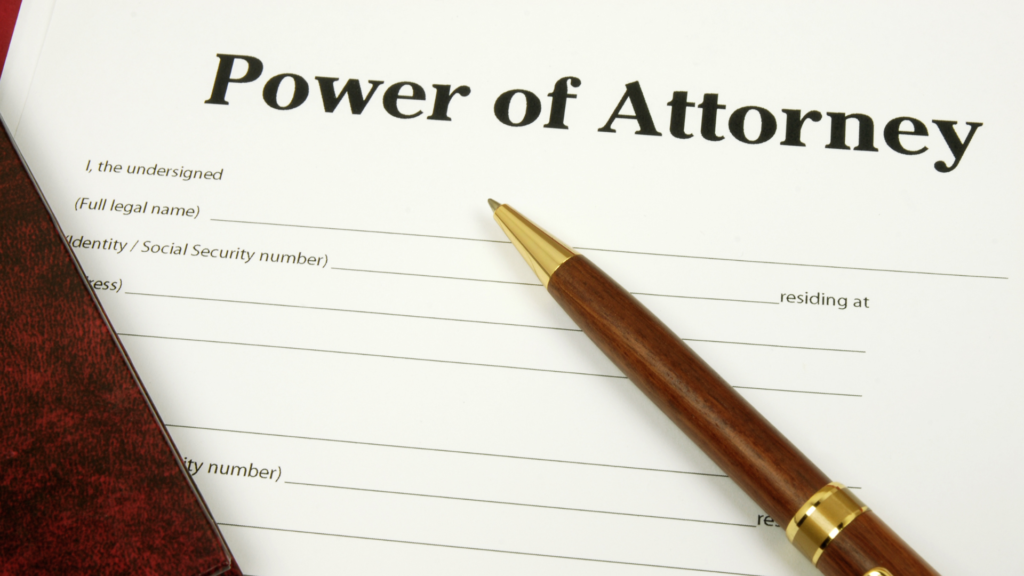What is Power of Attorney in Ontario and Why You Need to Understand it

If something should happen to you such as an accident or illness that impacts your ability to make financial and/or personal care decisions for yourself, then who will make those important decisions for you? That is why, once you have passed eighteen years of age (sixteen for personal care), you can and should have a Power of Attorney in place. This article covers the basics of power of attorney in Ontario and why you need to understand it.
Different Types of Power of Attorney
A power of attorney (POA) is a legal document in which you give a specific designated person the right to make decisions on your behalf. The POA may also include your directions and wishes relative to your care and/or financial affairs.
In Ontario there are three types of Power of Attorney (POA). They are General POA for Property, Continuing POA for Property and POA for Personal Care.
In cases where there are different persons acting as the POA for Property and POA for Personal Care, there may be events where they will be required to work together, such as a change in housing where a residence may be sold and/or moving to a care facility when required for your wellbeing.
Anybody acting on your behalf under a POA must only do what is in your best interests.
Continuing Power of Attorney for Property (CPOA)
CPOA allows the person you name to make decisions concerning your financial affairs even if you become mentally incapable. These decisions may include:
- Paying bills
- Collecting any money owed to you
- Maintaining or selling your house
- Managing your investments
- Signing legal documents on your behalf
Non-continuing Power of Attorney for Property
A non-continuing Power of Attorney for Property allows someone else to look after your financial affairs for a specified time period unless you become mentally or physically incapable. This type of POA is used for a specified period, where you may be incapacitated due to travel or other commitments and you cannot adequately manage your financial responsibilities.
Power of Attorney for Personal Care (POAPC)
This type of POA allows someone else to make decisions concerning your personal wellbeing, such as housing, health care, meals, clothing, your direction for life-support, and organ donation, among other matters.
If You Don’t Have a Power Of Attorney
A common misconception is that if you become incapacitated without a POA, your immediate family can step in and make decisions foryou.
While this is the case for some personal care decisions, it is not the case for financial decisions. Someone must apply to a court for permission to be your representative.
When there is no capable family member or friend, a guardian will be appointed by either the Ontario government’s Office of the Public Guardian and Trustee (OPGT) or the court.
What You Should Know About a Power of Attorney
- Wishes you express in a POA document while mentally capable about your future care and/or financial affairs will be binding as long as they are not impossible to fulfill.
- There is no requirement to register a POA with the government. It is prudent to let others close to you know about your POA document and to give a copy to another trusted person in addition to the person to whom you are granting the POA.
- When you appoint someone as a POA for Property, they can start making financial decisions for you immediately unless you state that they can only do so once you become mentally or physically incapable.
- POAs may differ by province and you should check when moving that your POA is still valid.
- You do not need a lawyer to establish a POA. However, if your affairs are complicated then it would be prudent to employ a lawyer’s services.
Establishing A Power of Attorney
The requirements for a Power of Attorney to be a legally binding are:
- You must have legal and mental capacity to provide the POA
- You must be at least sixteen years of age to elect a personal care POA
- You must be at least eighteen years of age to elect a POA for property
- The document must be complete, signed and have two eligible witnesses
- It does not need to be filed with any government office to be binding
- While not required, legal advice may be beneficial
The OPGT provides forms for POA for Property and POA for Personal Care. These may be obtained from Service Ontario.
The Bottom Line
A Power of Attorney is not just for seniors or those considering end-of-life care because “life happens”. That is why, as soon as you become an adult, you should prepare a Power of Attorney and a Will to be included in your fully comprehensive financial plan. As a last word of advice, the main financial purpose of having a POA is to make sure that someone can manage your finances if you are no longer able to make these decisions yourself, therefore it is important that your financial services firm accepts the POA.
At Bloom Investment Counsel, Inc. we are happy to work with all your trusted partners to protect, preserve and build lasting family wealth.
Follow Bloom Investment Counsel, Inc. on LinkedIn to stay up to date on our most recent articles.
This content is provided for general informational purposes only and does not constitute financial, investment, tax, legal or accounting advice nor does it constitute an offer or solicitation to buy or sell any securities referred to. Individual circumstances and current events are critical to sound investment planning; anyone wishing to act on this content should consult with his or her financial partner or advisor.